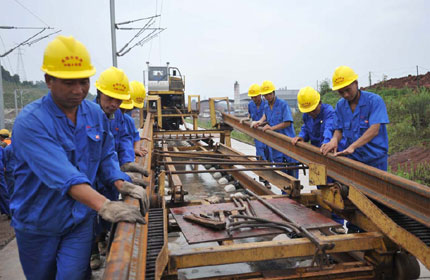Words gain international wings
Updated: 2014-06-27 07:33
By Cecily Liu (China Daily Europe)
|
|||||||||||
|
Charlesworth stand at Beijing International Book Fair. Provided to China Daily |
A British publishing firm that specializes in academic works finds China is a haven
Competitive labor costs in China attracted a publishing services business in Huddersfield, northern England, to relocate a large part of its business to Beijing 15 years ago. In that time The Charlesworth Group has discovered that China provides many more opportunities.
Around 2000, the company, which provides services as varied as typesetting to full project management, came under cost pressure due to huge technological changes in the publishing industry. A lot more content was being digitized, and many publishing service companies moved their content processing work overseas.
"As the technology changed, you could do the work anywhere in the world, and publishers demanded lower and lower prices," says group chief executive officer Helen Charlesworth.
Many of The Charlesworth Group's competitors moved their work offshore to India, but The Charlesworth Group chose China.
When The Charlesworth Group first ventured into China it had 100 staff working for it, all of whom were in Britain. Now, about 200 staff are in China, some are in the US, and there are just 10 in Britain. The UK staff predominantly take on management, editorial and administrative roles.
The new opportunities the company identified in China enabled The Charlesworth Group to expand from its original focus of helping academic publishers process content, to helping publishers sell their content in China.
With the company's knowledge of international publishing and experience in China, it can now help Chinese publishers expand internationally.
"We moved to China because we were under pressure to do production work more cheaply," Charlesworth says.
"Our customers for these services asked us to help them understand the Chinese market and sell their content to Chinese academic institutions," Charlesworth says.

When the company expanded into China it had limited experience of representing publishers and promoting their output. Fifteen years on, it is a global representative for foreign publishers and learned societies in China, acting for more than 80 organizations to provide Chinese researchers access to the best international content in their disciplines.
Charlesworth says the process of representing academic publishers in China requires frequent visits from her team to Chinese academic libraries and other organizations, including research laboratories or financial institutes that want to access global information.
"This may seem a world away from the activities of the company when it was first founded as a local printer, but the same core values remain: providing open and knowledgeable services through a truly professional team."
The Charlesworth Group was founded in 1928 by Harry Charlesworth and his wife Olive, originally with the primary function of printing sports related material.
Neil Charlesworth joined his father's company as an apprentice in the 1950s along with his sister Hazel Charlesworth, and they were the significant drivers of the company's success over many years. Neil remains executive chairman, with Helen Charlesworth beginning her time in the business in 1994, soon after she finished her university degree.
Over the years in China the company's services have expanded to include a range of tailored publishing services in academic publishing, including translation services, language polishing for non-native English writing and other author-supporting services.
More recently, The Charlesworth Group has witnessed a trend of Chinese publishers and academics integrating their work with the global publishing scene, and believes this creates further opportunities for the company.
Internationalizing China's publishing industry is a big focus of the Chinese government, as is shown by the significant support China's General Administration of Press and Publication gave to the London Book Fair in 2012 when China was made the country of market focus.
During the fair, many Chinese publishers exhibited their best published works, and many distinguished figures from China's publishing industry gave presentations.
Charlesworth says events like this are great in "putting Chinese publishing into the minds of Western publishers", and that they help promote Chinese publishing.
"Increasingly, Chinese publishers are going into partnerships with Western publishers, and we can help them manage those relationships. In the future I believe Chinese publishers will be able to publish their content in their own right, selling content rather than partnering. It will be a new development in the market.
"Chinese publishers are learning the value of the copyright of their publications. We assist this process by explaining the international copyright business models and representing leading international organizations in these areas. This is just one of the ways we can help as they make steps internationally," Charlesworth says.
Another step Chinese publishers will need to consider is how they host their content for international access to gain the maximum global traffic, she says.
In addition, The Charlesworth Group works with Chinese academics, helping them produce work of a level expected for international academic journals.
Increasingly, the quality of research carried out in China can equal the quality of that of Western peers. Chinese academics seek to have their research published in internationally recognized Western publications. However, barriers surrounding the quality of the English, understanding of the submission process, and rules relating to plagiarism can lead to rejection, Charlesworth says.
The Charlesworth Group possesses a global network of editors that can help non-native English academics present their research article, in the correct manner in terms of quality of English scientific expression and structure, to the journals they wish to submit to.
The Charlesworth Group originally established operations in Beijing, but about five years ago it relocated to Lang Fang, a prefecture-level city of Hebei province, in a move driven largely by wage increases in Beijing.
Charlesworth says that despite rises in pay across China it is still low enough to justify the company's investment there.
"I think Western companies offshoring to developing countries need to appreciate that their government wants to improve living standards for its people. That happens in all BRIC countries," she says.
As China's growth is so rapid, staff retention is a challenge that must be managed. The Charlesworth Group provides comprehensive training for employees to make them want to stay longer.
"We know that graduates will want to get a range of work experience and are not necessarily going to stay in the business for more than two or three years," Charlesworth says. "Rather than trying to make them stay, we try to look at what skills they will have when they go on to somewhere else. It is a good way to benefit staff, and maybe they will stay for an extra year."
The Charlesworth Group provides mainly technical training to its employees, to ensure they have the skills for the content coding work. To help Chinese employees improve their English, The staff are encouraged to speak English in the office and practice English through work emails.
Almost all the 200 employees in China are Chinese, including the local management. The company hires mostly Chinese university graduates with English degrees.
The Charlesworth Group's principal customers are global academic publishers, to whom it provides services to help them disseminate academic content so researchers gain value from this knowledge.
"We all benefit from this sharing of knowledge, be it in science, finance, or medicine," Charlesworth says. "I feel passionately that the activities of every member of The Charlesworth Team are contributing to this sharing of global knowledge."
cecily.liu@chinadaily.com.cn
(China Daily European Weekly 06/27/2014 page19)
Today's Top News
China's top banks account for 32% of global earnings
HK chief poll has 'no legal standing'
Transformers 4 breaks records
China to increase personnel for peace
Over 1,200 Chinese evacuated to Baghdad
World Cup can damage health
Transformers helps growth in China
Prime London properties lure investors
Hot Topics
Lunar probe , China growth forecasts, Emission rules get tougher, China seen through 'colored lens', International board,
Editor's Picks

|

|

|

|

|

|






